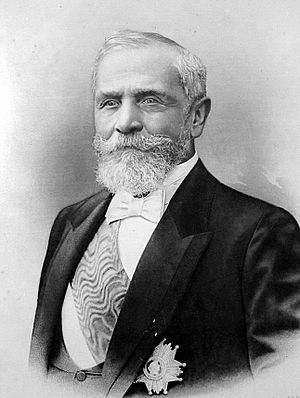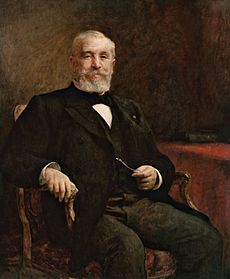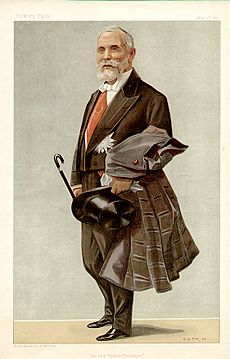Émile Loubet facts for kids
Quick facts for kids
Émile Loubet
|
|
|---|---|

Photograph by Eugène Pirou, 1900
|
|
| President of France | |
| In office 18 February 1899 – 18 February 1906 |
|
| Prime Minister | Charles Dupuy Pierre Waldeck-Rousseau Émile Combes Maurice Rouvier |
| Preceded by | Félix Faure |
| Succeeded by | Armand Fallières |
| Prime Minister of France | |
| In office 27 February 1892 – 6 December 1892 |
|
| President | Sadi Carnot |
| Preceded by | Charles de Freycinet |
| Succeeded by | Alexandre Ribot |
| Personal details | |
| Born | 30 December 1838 Marsanne, France |
| Died | 20 December 1929 (aged 90) Montélimar, France |
| Political party | Democratic Republican Alliance |
| Spouses |
Marie-Louise Picard
(m. 1869–1925) |
| Alma mater | University of Paris |
Émile François Loubet (born December 30, 1838 – died December 20, 1929) was an important French leader. He served as the 45th Prime Minister of France for a short time in 1892. Later, he became the President of France, holding the office from 1899 to 1906.
Loubet was trained as a lawyer. He first became the mayor of his hometown, Montélimar. People noticed him because he was a strong speaker. He was elected to the French Parliament, first to the Chamber of Deputies, then to the Senate. As President, he oversaw the successful Paris World's Fair of 1900. He also helped create the Entente Cordiale, a friendly agreement between France and the United Kingdom. This agreement helped solve big disagreements between the two countries.
Contents
Early Life and Education
Émile Loubet was born on December 30, 1838, in a town called Marsanne. His father was a farmer and also the mayor of Marsanne.
In 1862, Émile went to Paris to study law. He earned his law degree the next year. While he was a student, he saw the Republican party become very popular in Paris. After finishing his studies, he started working as a lawyer in Montélimar. In 1869, he married Marie-Louise Picard. He also inherited some land in a nearby area called Grignan.
What Émile Loubet Looked Like
An American politician named William Jennings Bryan described Émile Loubet. He said Loubet was "below the medium height," even for French people. He had broad shoulders, which showed he was physically strong. His hair, beard, and mustache were all snow white. He kept his beard cut in a square shape at his chin. Bryan also noted that Loubet's voice was soft. He spoke with a lot of energy, using his hands to emphasize his words.
Beginning His Political Journey
When the French Empire ended in 1870, Émile Loubet became the mayor of Montélimar. From then on, he strongly supported Léon Gambetta, another important French politician.
In 1876, the people of Montélimar elected him to the Chamber of Deputies, which is like one part of the French Parliament. He was one of 363 members who voted against the government in 1877. This vote showed they did not trust the current leaders.
When new elections were held in October, Loubet was re-elected. People in his hometown were even more excited about him because the government had tried to remove him from his mayor position. In the Chamber of Deputies, he focused on education. He worked to create free, required, and non-religious primary schools for all children.
In 1880, he became the head of the local council in Drôme. He supported the government's efforts to expand France's colonies. This made him an important figure in the moderate Republican party.
Becoming Prime Minister
Loubet joined the Senate, another part of the French Parliament, in 1885. From 1887 to 1888, he served as the Minister of Public Works.
In 1892, President Sadi Carnot, who was a friend of Loubet, asked him to form a government. Loubet became the Prime Minister and also the Minister of the Interior. During this time, he had to deal with some difficult situations. He helped resolve a big workers' strike in Carmaux by acting as an arbitrator. Some people thought his decision favored the workers too much.
He lost his position as Prime Minister in November because of a scandal involving the Panama Canal. However, he remained the Minister of the Interior in the next government. He resigned from that role in January.
President of France (1899–1906)
Loubet was known as a strong and clear speaker. People also saw him as a safe and honest leader. Because of this, he became the president of the Senate in 1896.
In February 1899, he was chosen to be the President of France. He took over after Félix Faure passed away. Loubet won with 483 votes, beating his main opponent, Jules Méline.
His presidency began during a time of great disagreement in France, especially over the Dreyfus Affair. This was a big scandal that divided the country. Loubet faced strong opposition from those who did not want the case to be re-examined. At one event, someone even hit him on the head with a cane.
President Loubet worked hard to bring people together and resolve the Dreyfus affair. He asked Waldeck-Rousseau to form a new government and urged all Republicans to unite. With their efforts, the Dreyfus affair was finally settled. Loubet, following advice from his War Minister, reduced the sentence of Alfred Dreyfus.
During Loubet's time as president, there were also big changes regarding the relationship between the government and the church. The government passed a law in 1905 that officially separated the church and the state. This meant the government would no longer control or fund religious organizations.
France and Britain had some disagreements, especially about the South African War and the Dreyfus affair. However, these differences were resolved with the Entente Cordiale in 1904. This agreement recognized France's claims in Morocco and Britain's control of Egypt.
President Loubet came from a farming family. He was not like some previous presidents who came from noble backgrounds. He officially opened the Paris Exhibition of 1900, a huge world's fair. He also welcomed Emperor Nicholas II of Russia to France and visited Russia himself in 1902.
Loubet also exchanged visits with other European leaders, including King Edward VII of Britain, the king of Portugal, the king of Italy, and the king of Spain. During the king of Spain's visit in 1905, someone tried to attack their carriage with a bomb. Luckily, both leaders were safe.
When his presidency ended in January 1906, Émile Loubet became the first President of the Third Republic to complete his full term without resigning. He then retired from public life. He passed away on December 20, 1929, at the age of 90.
Awards and Honors
Émile Loubet received many important awards and honors from different countries:
 Belgium: Grand Cordon of the Order of Leopold, 1900
Belgium: Grand Cordon of the Order of Leopold, 1900 Principality of Bulgaria: Grand Cross of St. Alexander, in Diamonds, July 1902
Principality of Bulgaria: Grand Cross of St. Alexander, in Diamonds, July 1902 Denmark: Knight of the Elephant, 1 November 1900
Denmark: Knight of the Elephant, 1 November 1900 Ethiopian Empire: Grand Cross of the Star of Ethiopia
Ethiopian Empire: Grand Cross of the Star of Ethiopia German Empire: Knight of the Black Eagle
German Empire: Knight of the Black Eagle Kingdom of Italy: Knight of the Annunciation, 10 April 1901
Kingdom of Italy: Knight of the Annunciation, 10 April 1901 Empire of Japan: Grand Cordon of the Order of the Chrysanthemum, 5 August 1899
Empire of Japan: Grand Cordon of the Order of the Chrysanthemum, 5 August 1899 Luxembourg: Knight of the Gold Lion of Nassau, 1902
Luxembourg: Knight of the Gold Lion of Nassau, 1902 Netherlands: Grand Cross of the Netherlands Lion, 1902
Netherlands: Grand Cross of the Netherlands Lion, 1902 Ottoman Empire: Order of Distinction
Ottoman Empire: Order of Distinction Kingdom of Portugal: Grand Cross of the Tower and Sword, October 1902
Kingdom of Portugal: Grand Cross of the Tower and Sword, October 1902 Russian Empire:
Russian Empire:
- Knight of St. Andrew
- Knight of St. Alexander Nevsky
- Knight of St. Anna, 1st Class
- Knight of St. Stanislaus, 1st Class
 San Marino: Grand Cross of the Order of San Marino
San Marino: Grand Cross of the Order of San Marino Kingdom of Serbia: Grand Cross of the White Eagle
Kingdom of Serbia: Grand Cross of the White Eagle Spain: Knight of the Golden Fleece, 22 June 1902
Spain: Knight of the Golden Fleece, 22 June 1902 Siam: Knight of the Order of the Royal House of Chakri, 29 August 1902
Siam: Knight of the Order of the Royal House of Chakri, 29 August 1902
 Sweden-Norway:
Sweden-Norway:
- Knight of the Seraphim, 17 April 1899
- Knight of the Norwegian Lion, 1 December 1904
 Monaco: Grand Cross of St. Charles, 15 March 1901
Monaco: Grand Cross of St. Charles, 15 March 1901
Images for kids
See also
 In Spanish: Émile Loubet para niños
In Spanish: Émile Loubet para niños
 | Charles R. Drew |
 | Benjamin Banneker |
 | Jane C. Wright |
 | Roger Arliner Young |





